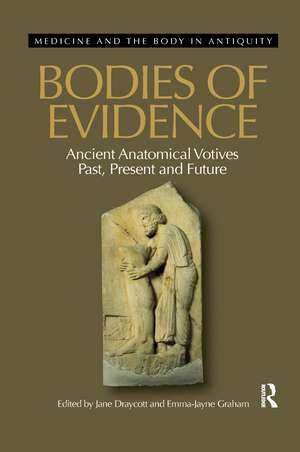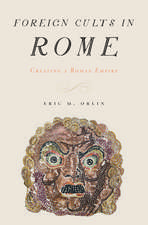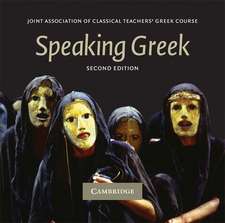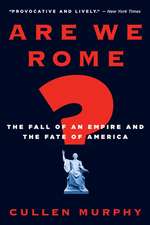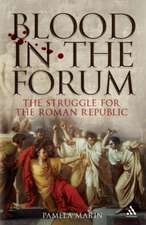Bodies of Evidence: Ancient Anatomical Votives Past, Present and Future: Medicine and the Body in Antiquity
Editat de Jane Draycott, Emma-Jayne Grahamen Limba Engleză Paperback – 30 iun 2020
| Toate formatele și edițiile | Preț | Express |
|---|---|---|
| Paperback (1) | 259.98 lei 6-8 săpt. | |
| Taylor & Francis – 30 iun 2020 | 259.98 lei 6-8 săpt. | |
| Hardback (1) | 822.54 lei 6-8 săpt. | |
| Taylor & Francis – 12 dec 2016 | 822.54 lei 6-8 săpt. |
Preț: 259.98 lei
Preț vechi: 311.41 lei
-17% Nou
Puncte Express: 390
Preț estimativ în valută:
49.74€ • 51.94$ • 41.08£
49.74€ • 51.94$ • 41.08£
Carte tipărită la comandă
Livrare economică 15-29 aprilie
Preluare comenzi: 021 569.72.76
Specificații
ISBN-13: 9780367595579
ISBN-10: 0367595575
Pagini: 288
Dimensiuni: 156 x 234 mm
Greutate: 0.45 kg
Ediția:1
Editura: Taylor & Francis
Colecția Routledge
Seria Medicine and the Body in Antiquity
Locul publicării:Oxford, United Kingdom
ISBN-10: 0367595575
Pagini: 288
Dimensiuni: 156 x 234 mm
Greutate: 0.45 kg
Ediția:1
Editura: Taylor & Francis
Colecția Routledge
Seria Medicine and the Body in Antiquity
Locul publicării:Oxford, United Kingdom
Public țintă
PostgraduateCuprins
List of Figures
Notes on Contributors
Preface
Abbreviations
Introduction: Debating the Anatomical Votive
Emma-Jayne Graham and Jane Draycott
Chapter 1: Corpora in Connection: Anatomical Votives and the Confession Stelai of Lydia and Phrygia
Justine Potts
Chapter 2: Partible Humans and Permeable Gods: Anatomical Votives and Personhood in the Sanctuaries of Central Italy
Emma-Jayne Graham
Chapter 3: Anatomical Votives (and Swaddled Babies): from Republican Italy to Roman Gaul
Olivier de Cazanove
Chapter 4: Hair Today, Gone Tomorrow: The Use of Real, False and Artificial Hair as Votive Offerings
Jane Draycott
Chapter 5: Demeter as an Ophthalmologist? Eye Votives and the Cult of Demeter and Kore
Georgia Petridou
Chapter 6: Wombs for the Gods
Rebecca Flemming
Chapter 7: Ritual and Meaning: Contextualising Votive Terracotta Infants in Hellenistic Italy
Fay Glinister
Chapter 8: The foot as gnṓrisma
Sara Chiarini
Chapter 9: The Open Man: Anatomical Votive Busts Between the History of Medicine and Archaeology
Laurent Haumesser
Chapter 10: Fragmentation and the Body’s Boundaries: Reassessing the Body in Parts
Ellen Adams
Chapter 11: Votive Genitalia in the Wellcome Collection: Modern Receptions of Ancient Sexual Anatomy
Jen Grove
Chapter 12: Votive Futures: an Afterword
Jessica Hughes
Bibliography
Index
Notes on Contributors
Preface
Abbreviations
Introduction: Debating the Anatomical Votive
Emma-Jayne Graham and Jane Draycott
Chapter 1: Corpora in Connection: Anatomical Votives and the Confession Stelai of Lydia and Phrygia
Justine Potts
Chapter 2: Partible Humans and Permeable Gods: Anatomical Votives and Personhood in the Sanctuaries of Central Italy
Emma-Jayne Graham
Chapter 3: Anatomical Votives (and Swaddled Babies): from Republican Italy to Roman Gaul
Olivier de Cazanove
Chapter 4: Hair Today, Gone Tomorrow: The Use of Real, False and Artificial Hair as Votive Offerings
Jane Draycott
Chapter 5: Demeter as an Ophthalmologist? Eye Votives and the Cult of Demeter and Kore
Georgia Petridou
Chapter 6: Wombs for the Gods
Rebecca Flemming
Chapter 7: Ritual and Meaning: Contextualising Votive Terracotta Infants in Hellenistic Italy
Fay Glinister
Chapter 8: The foot as gnṓrisma
Sara Chiarini
Chapter 9: The Open Man: Anatomical Votive Busts Between the History of Medicine and Archaeology
Laurent Haumesser
Chapter 10: Fragmentation and the Body’s Boundaries: Reassessing the Body in Parts
Ellen Adams
Chapter 11: Votive Genitalia in the Wellcome Collection: Modern Receptions of Ancient Sexual Anatomy
Jen Grove
Chapter 12: Votive Futures: an Afterword
Jessica Hughes
Bibliography
Index
Notă biografică
Jane Draycott is Lord Kelvin Adam Smith Research Fellow in Ancient Science and Technology at the University of Glasgow, UK. Her research focuses on health and well-being in antiquity. She has published on a wide range of subjects relating to the history and archaeology of medicine.
Emma-Jayne Graham is Senior Lecturer in Classical Studies at The Open University, UK. Her research focuses on the archaeology of Roman Italy, with a particular interest in the treatment of the body and its representation in material culture. She has published on mortuary practices, infant health and death, sensory experience and the materiality of votive religion.
Emma-Jayne Graham is Senior Lecturer in Classical Studies at The Open University, UK. Her research focuses on the archaeology of Roman Italy, with a particular interest in the treatment of the body and its representation in material culture. She has published on mortuary practices, infant health and death, sensory experience and the materiality of votive religion.
Recenzii
"...this volume accomplishes its goals well and paves the way for future studies on anatomical votives beyond the typological. The authors show that such dedications were not limited to the healing sanctuaries of Classical Greece and that their meanings went beyond simple equations between object and body."
- Debby Sneed, University of California, Los Angeles, USA, Bryn Mawr Classical Review 2018
"The editors' introduction lays out the inherent problems, challenges, and questions related to this material, such as definitions and terminology, ancient contexts, medical significance, and meanings with the religious setting. This is an ambitious attempt to bring together many different types, times, and places of relevance, as well as to present 'deliberately diverse approaches' to the archaeological material. Also welcome are chapters that incorporate the appearance of anatomical votices in modern art or their role in modern collecting ... Several themes cut across the chapters, including gender, age, and social status, as well as physical appearance, sexuality, reproduction, and personhood.[...]Ultimately, this book contributes to pan-Mediterranean conversations about ancient religion, trade, and sea routes over a long period, and adds to an expanding corpus of studies devoted to individual deities."
- Tyler Jo Smith, University of Virginia, USA, Religious Studies Review 2017
"Although it is focused on Classical Antiquity strictly defined, the work will be of interest to Byzantinist-historians of medicine as it opens new perspectives for the analysis of an archeological genre all too often neglected."
-Touwaide, Byzantinische Zeitschrift issue 110 (= 2017/4).
"In short, the essays assembled in this volume offer a rich and rewarding assortment of perspectives from which to view the practice of dedicating the material representation of a body part at a sanctuary of later curating such an object in a collection focused on medical history or reimagining the fragmented human body in a work of art.;
- Rebecca Miller Ammerman, Colgate University
"The book offers a series of remarkably detailed studies on the sensory culture of ancient Rome. [...]for me, the book’s central and most important contribution: we might be able to pretend a kind of neutrality, transparency, or objectivity when we offer a critical edition or reconstruct an ancient battle. But such pretense is utterly impossible when it comes to sensory history, for the simple reason that we have to use our own senses as part of the scholarly apparatus."
-Sean Gurd, University of Missouri, Columbia, MO, USA, Greek and Roman Musical Studies
- Debby Sneed, University of California, Los Angeles, USA, Bryn Mawr Classical Review 2018
"The editors' introduction lays out the inherent problems, challenges, and questions related to this material, such as definitions and terminology, ancient contexts, medical significance, and meanings with the religious setting. This is an ambitious attempt to bring together many different types, times, and places of relevance, as well as to present 'deliberately diverse approaches' to the archaeological material. Also welcome are chapters that incorporate the appearance of anatomical votices in modern art or their role in modern collecting ... Several themes cut across the chapters, including gender, age, and social status, as well as physical appearance, sexuality, reproduction, and personhood.[...]Ultimately, this book contributes to pan-Mediterranean conversations about ancient religion, trade, and sea routes over a long period, and adds to an expanding corpus of studies devoted to individual deities."
- Tyler Jo Smith, University of Virginia, USA, Religious Studies Review 2017
"Although it is focused on Classical Antiquity strictly defined, the work will be of interest to Byzantinist-historians of medicine as it opens new perspectives for the analysis of an archeological genre all too often neglected."
-Touwaide, Byzantinische Zeitschrift issue 110 (= 2017/4).
"In short, the essays assembled in this volume offer a rich and rewarding assortment of perspectives from which to view the practice of dedicating the material representation of a body part at a sanctuary of later curating such an object in a collection focused on medical history or reimagining the fragmented human body in a work of art.;
- Rebecca Miller Ammerman, Colgate University
"The book offers a series of remarkably detailed studies on the sensory culture of ancient Rome. [...]for me, the book’s central and most important contribution: we might be able to pretend a kind of neutrality, transparency, or objectivity when we offer a critical edition or reconstruct an ancient battle. But such pretense is utterly impossible when it comes to sensory history, for the simple reason that we have to use our own senses as part of the scholarly apparatus."
-Sean Gurd, University of Missouri, Columbia, MO, USA, Greek and Roman Musical Studies
Descriere
Dedicating objects to the divine was a central component of both Greek and Roman religion. Some of the most conspicuous offerings were shaped like parts of the internal or external human body: so-called ‘anatomical votives’. This volume scrutinizes this distinctive dedicatory phenomenon, bringing together for the first time a range of methodolog
